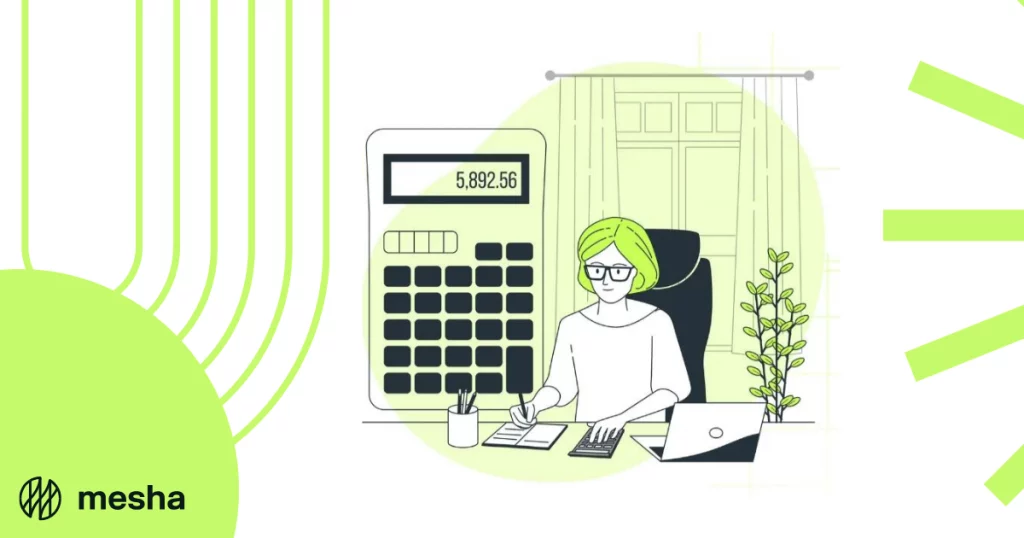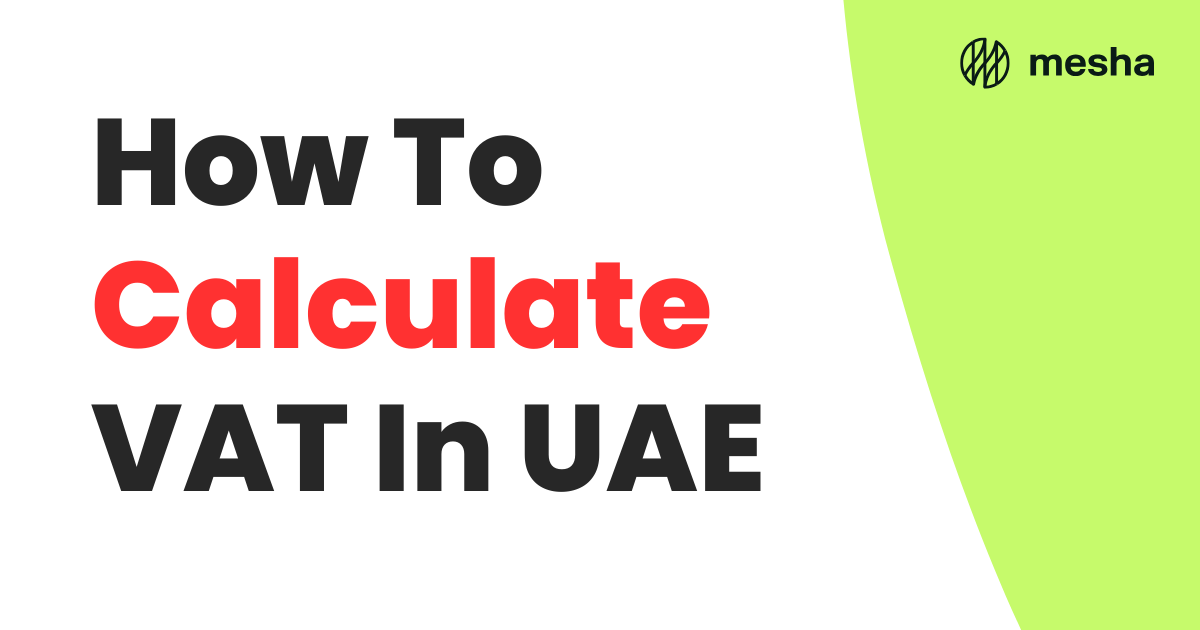How To Calculate VAT In UAE [Expert Advice 2024]

Learn how to calculate VAT in UAE with our comprehensive guide. Understand the process and stay compliant with the latest tax regulations. Value Added tax in the United Arab Emirates.
Understanding the Value Added Tax (VAT) system in the United Arab Emirates (UAE) can be a complex task. Especially when it comes to calculating VAT for goods and services.
This article aims to simplify that process. It provides a comprehensive guide on how to calculate VAT in the UAE.
We will delve into the standard VAT rate in the UAE. We’ll also discuss the types of goods and services that are subject to VAT.
Moreover, we’ll explore VAT exemptions and zero-rated supplies. We’ll also touch upon the role of VAT calculators in making accurate calculations.
Whether you’re a business owner, an accountant, or an individual dealing with VAT, this guide is for you.
By the end of this article, you’ll have a clear understanding of how to calculate VAT in the UAE.
Table of Contents

Understanding VAT in UAE
VAT, or Value Added Tax, is a consumption tax placed on a product whenever value is added at each stage of the supply chain. It is levied on the sale of goods and services and is collected at every point of sale.
In the UAE, VAT was introduced in 2018 as a new source of revenue for the government. It is used to provide high-quality public services and reduce dependence on oil and other hydrocarbons as a source of revenue. Understanding how to calculate VAT is crucial for businesses and individuals alike.
The standard VAT rate in the UAE is 5%. This rate applies to most goods and services unless they are exempt or zero-rated.
It’s important to note that the 5% VAT is not a flat rate applied to the total cost of a product or service. Instead, it’s calculated on the value added at each stage of production or distribution. This ensures that the tax is fairly distributed among all parties involved in the supply chain.
In the UAE, VAT applies to a wide range of goods and services. This includes, but is not limited to, food and beverages, electronics, clothing, and professional services.
However, there are some exceptions. Certain goods and services are either exempt from VAT or are taxed at a zero rate.
Here’s a brief list of some common items that are subject to VAT in the UAE:
- Food and beverages
- Electronics
- Clothing
- Professional services
- Real estate transactions
- Hotel services and entertainment
- Imported goods and services for personal use
- Second-hand goods, collector’s items, and antiques
- Charitable activities and donations.
Step-by-Step Guide to Calculating VAT
Calculating VAT in the UAE is a straightforward process. It involves a simple formula that can be applied to any product or service.
The first step is to identify the original price of the product or service. This is the price before VAT is added.
Next, multiply the original price by the VAT rate. In the UAE, the standard VAT rate is 5%.
This calculation will give you the VAT amount. This is the additional cost that is added to the original price due to VAT.
Finally, add the VAT amount to the original price to get the total price. This is the price that the customer pays, including VAT.
Calculating VAT Inclusive Prices
When prices are VAT inclusive, it means that the VAT is already included in the displayed price.
To calculate the VAT amount from a VAT inclusive price, you can use the formula: VAT Amount = (Total Price x VAT Rate) / (1 + VAT Rate).
Calculating VAT Exclusive Prices
VAT exclusive prices are prices that do not include VAT.
To calculate the total price from a VAT exclusive price, you can use the formula: Total Price = Original Price + VAT Amount.
VAT Exemptions and Zero-Rated Supplies
In the UAE, certain goods and services are exempt from VAT. This means that no VAT is charged on these items, and businesses cannot reclaim any VAT they have paid on costs related to these supplies.
Exempt supplies include certain financial services, residential properties, and local passenger transport.
Zero-rated supplies, on the other hand, are taxable but at a 0% rate. This means businesses don’t charge VAT on these supplies, but they can reclaim VAT they’ve paid on costs.
Zero-rated supplies include:
- Exports of goods and services outside the GCC
- International transportation, and related supplies
- Supplies of certain sea, air and land means of transportation
- Certain investment grade precious metals
- Newly constructed residential properties
- Certain education services
- Certain Healthcare services
VAT Registration and Compliance
Businesses in the UAE that meet certain criteria are required to register for VAT. This includes businesses with a turnover exceeding AED 375,000 per annum.
Once registered, businesses must comply with VAT regulations. This includes charging VAT on taxable supplies, reclaiming VAT on eligible purchases, and filing regular VAT returns.
Non-compliance with VAT regulations can result in penalties. Therefore, it’s crucial for businesses to understand their VAT obligations and ensure they are meeting them.
Using a VAT Calculator in the UAE
A VAT calculator can be a useful tool for businesses and individuals in the UAE. It simplifies the process of calculating VAT on goods and services.
These calculators are designed to provide quick and accurate VAT calculations. They can be particularly helpful for businesses that deal with a large number of transactions.
However, it’s important to ensure that the calculator is designed for UAE-specific calculations. This is because VAT rates and regulations can vary from one country to another.
Benefits of Using a VAT Calculator
Using a VAT calculator can save time and reduce errors. It eliminates the need for manual calculations, which can be prone to mistakes.
Moreover, it can help businesses ensure they are charging the correct amount of VAT. This can be crucial for maintaining compliance with VAT regulations.
Common VAT Calculation Mistakes to Avoid
When calculating VAT, it’s important to avoid common mistakes. One such error is not distinguishing between VAT inclusive and exclusive prices.
Another common mistake is not staying updated with the latest VAT laws and regulations. This can lead to incorrect calculations and potential penalties for non-compliance.
Staying Updated with VAT Laws and Regulations
Staying updated with the latest VAT laws and regulations is crucial. The Federal Tax Authority (FTA) regularly updates these rules to ensure fair taxation.
It’s advisable to regularly check the FTA’s official website or subscribe to their updates. This will help you stay informed and avoid any potential penalties for non-compliance.
Conclusion and Additional Resources
Understanding and calculating VAT in the UAE can be complex. However, with the right knowledge and tools, it becomes manageable.
For further assistance, consider consulting with a tax professional. Also, the FTA’s official website provides comprehensive resources on UAE VAT matters.


